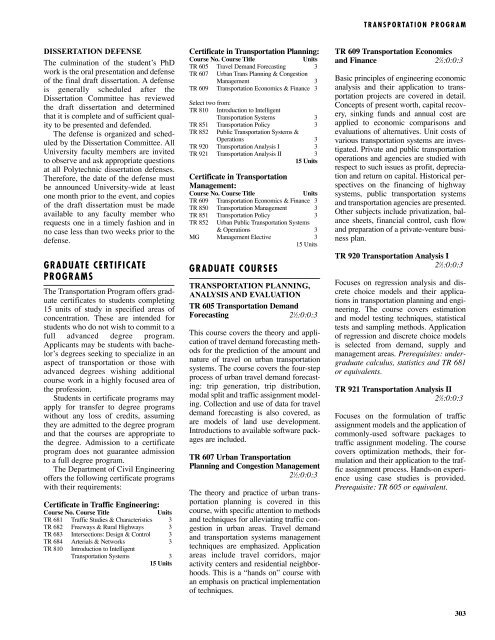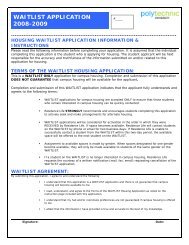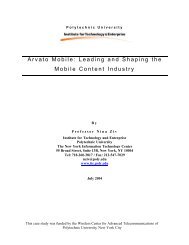POLYTECHNIC UNIVERSITY 2005-2007
POLYTECHNIC UNIVERSITY 2005-2007
POLYTECHNIC UNIVERSITY 2005-2007
You also want an ePaper? Increase the reach of your titles
YUMPU automatically turns print PDFs into web optimized ePapers that Google loves.
TRANSPORTATION PROGRAM<br />
DISSERTATION DEFENSE<br />
The culmination of the student’s PhD<br />
work is the oral presentation and defense<br />
of the final draft dissertation. A defense<br />
is generally scheduled after the<br />
Dissertation Committee has reviewed<br />
the draft dissertation and determined<br />
that it is complete and of sufficient quality<br />
to be presented and defended.<br />
The defense is organized and scheduled<br />
by the Dissertation Committee. All<br />
University faculty members are invited<br />
to observe and ask appropriate questions<br />
at all Polytechnic dissertation defenses.<br />
Therefore, the date of the defense must<br />
be announced University-wide at least<br />
one month prior to the event, and copies<br />
of the draft dissertation must be made<br />
available to any faculty member who<br />
requests one in a timely fashion and in<br />
no case less than two weeks prior to the<br />
defense.<br />
GRADUATE CERTIFICATE<br />
PROGRAMS<br />
The Transportation Program offers graduate<br />
certificates to students completing<br />
15 units of study in specified areas of<br />
concentration. These are intended for<br />
students who do not wish to commit to a<br />
full advanced degree program.<br />
Applicants may be students with bachelor’s<br />
degrees seeking to specialize in an<br />
aspect of transportation or those with<br />
advanced degrees wishing additional<br />
course work in a highly focused area of<br />
the profession.<br />
Students in certificate programs may<br />
apply for transfer to degree programs<br />
without any loss of credits, assuming<br />
they are admitted to the degree program<br />
and that the courses are appropriate to<br />
the degree. Admission to a certificate<br />
program does not guarantee admission<br />
to a full degree program.<br />
The Department of Civil Engineering<br />
offers the following certificate programs<br />
with their requirements:<br />
Certificate in Traffic Engineering:<br />
Course No. Course Title<br />
Units<br />
TR 681 Traffic Studies & Characteristics 3<br />
TR 682 Freeways & Rural Highways 3<br />
TR 683 Intersections: Design & Control 3<br />
TR 684 Arterials & Networks 3<br />
TR 810 Introduction to Intelligent<br />
Transportation Systems 3<br />
15 Units<br />
Certificate in Transportation Planning:<br />
Course No. Course Title<br />
Units<br />
TR 605 Travel Demand Forecasting 3<br />
TR 607 Urban Trans Planning & Congestion<br />
Management 3<br />
TR 609 Transportation Economics & Finance 3<br />
Select two from:<br />
TR 810 Introduction to Intelligent<br />
Transportation Systems 3<br />
TR 851 Transportation Policy 3<br />
TR 852 Public Transportation Systems &<br />
Operations 3<br />
TR 920 Transportation Analysis I 3<br />
TR 921 Transportation Analysis II 3<br />
15 Units<br />
Certificate in Transportation<br />
Management:<br />
Course No. Course Title<br />
Units<br />
TR 609 Transportation Economics & Finance 3<br />
TR 850 Transportation Management 3<br />
TR 851 Transportation Policy 3<br />
TR 852 Urban Public Transportation Systems<br />
& Operations 3<br />
MG Management Elective 3<br />
15 Units<br />
GRADUATE COURSES<br />
TRANSPORTATION PLANNING,<br />
ANALYSIS AND EVALUATION<br />
TR 605 Transportation Demand<br />
Forecasting 2 1 ⁄2:0:0:3<br />
This course covers the theory and application<br />
of travel demand forecasting methods<br />
for the prediction of the amount and<br />
nature of travel on urban transportation<br />
systems. The course covers the four-step<br />
process of urban travel demand forecasting:<br />
trip generation, trip distribution,<br />
modal split and traffic assignment modeling.<br />
Collection and use of data for travel<br />
demand forecasting is also covered, as<br />
are models of land use development.<br />
Introductions to available software packages<br />
are included.<br />
TR 607 Urban Transportation<br />
Planning and Congestion Management<br />
2 1 ⁄2:0:0:3<br />
The theory and practice of urban transportation<br />
planning is covered in this<br />
course, with specific attention to methods<br />
and techniques for alleviating traffic congestion<br />
in urban areas. Travel demand<br />
and transportation systems management<br />
techniques are emphasized. Application<br />
areas include travel corridors, major<br />
activity centers and residential neighborhoods.<br />
This is a “hands on” course with<br />
an emphasis on practical implementation<br />
of techniques.<br />
TR 609 Transportation Economics<br />
and Finance 2 1 ⁄2:0:0:3<br />
Basic principles of engineering economic<br />
analysis and their application to transportation<br />
projects are covered in detail.<br />
Concepts of present worth, capital recovery,<br />
sinking funds and annual cost are<br />
applied to economic comparisons and<br />
evaluations of alternatives. Unit costs of<br />
various transportation systems are investigated.<br />
Private and public transportation<br />
operations and agencies are studied with<br />
respect to such issues as profit, depreciation<br />
and return on capital. Historical perspectives<br />
on the financing of highway<br />
systems, public transportation systems<br />
and transportation agencies are presented.<br />
Other subjects include privatization, balance<br />
sheets, financial control, cash flow<br />
and preparation of a private-venture business<br />
plan.<br />
TR 920 Transportation Analysis I<br />
2 1 ⁄2:0:0:3<br />
Focuses on regression analysis and discrete<br />
choice models and their applications<br />
in transportation planning and engineering.<br />
The course covers estimation<br />
and model testing techniques, statistical<br />
tests and sampling methods. Application<br />
of regression and discrete choice models<br />
is selected from demand, supply and<br />
management areas. Prerequisites: undergraduate<br />
calculus, statistics and TR 681<br />
or equivalents.<br />
TR 921 Transportation Analysis II<br />
2 1 ⁄2:0:0:3<br />
Focuses on the formulation of traffic<br />
assignment models and the application of<br />
commonly-used software packages to<br />
traffic assignment modeling. The course<br />
covers optimization methods, their formulation<br />
and their application to the traffic<br />
assignment process. Hands-on experience<br />
using case studies is provided.<br />
Prerequisite: TR 605 or equivalent.<br />
303




